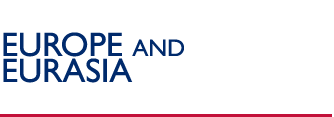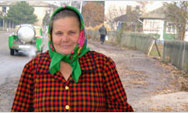Albanian Elections Demonstrate Democratic Development
USAID and the U.S. Government provided unprecedented electoral process support to the July 3 parliamentary elections in Albania. The results of these efforts were visible in every corner of the country at every step of the process.
USAID/Albania Mission Director, Harry Birnholz, believed the mission’s assistance was appropriately targeted, and proved to advance the overall conduct and administration of the election campaign and election.
 |
| A voter casts his party and candidate ballots at a polling station in eastern
Albania |
Together with the Central Elections Commission (CEC), USAID/Albania ran a successful voter information campaign with TV ads, banners, posters, ballot-box-shaped kiosks, even sugar packets, which explained voting procedures and urged people to cast ballots. The result was an electorate much better informed about voting procedures.
Albanian election officials received extensive training from USAID experts of voting and counting procedures. USAID/Albania also availed itself of a Participant Training Program to provide critical guidance to Albanian officials, political parties and NGOs on the most significant and potentially the most problematic feature of the new Electoral Code: the centralization of vote counting. Their instruction included study tours to the United Kingdom to observe centralized counting procedures in advance of elections in that country. USAID published training manuals that were placed in all 4,800 polling places and all 100 zonal counting centers. The training of officials diminished procedural irregularities, despite changes to the Election Code as late as April 2005.
With $400,000 from EUR/ACE, USAID/Albania produced up-to-date digitized maps of Albania’s polling units based on satellite images. These maps proved instrumental for updating voter lists in a country that has yet to develop a nationwide address system. The maps were also utilized by the Albanian Parliament to create election districts, by OSCE-ODIHR to deploy international election monitors.
With U.S. Embassy/Tirana Democracy Commission funds, USAID supported Albania’s largest, best organized and most visible domestic monitoring effort, carried out by a NGO coalition (under the Albanian Coalition Against Corruption) comprising 3,200 monitors sporting their official credentials, T-shirts and badges. USAID/Albania leveraged support from the American Chamber of Commerce in Albania and from the Balkan Trust for Democracy Fund to brand the domestic monitoring effort. Domestic monitors covered half of all polling places and were ubiquitous during the counting processes. Before deployment, domestic monitors received extensive training in their responsibilities as observers, were registered with the CEC and received official CEC monitoring credentials bearing the USAID logo. A public “branding” event the day before the election, featuring Ambassador Marcie Ries and OSCE Ambassador Pavel Vacek, highlighted the role of domestic monitors, raised public awareness of their efforts, and strengthened oversight of the electoral process.
EUR/ACE supplemental funds also leveraged a 66-member non-governmental observer team from the European Network of Election Monitoring Organizations (ENEMO), which provided another judgment on the electoral process. Teams monitored opening, voting and closing processes in 400 polling stations in all 100 zones on election day.
USAID/Albania also sponsored a successful media monitoring carried out by Albanian NGOs (under the banner of the ACAC), which produced measurable results in media coverage. The bi-weekly report cards that the media monitors produced prodded media to balance their coverage of the campaigns to comply with the Electoral Code. The media monitoring project surveyed 10 TV stations, four radio stations, and six of the larger print dailies. It evaluated content as well as amount of campaign and party coverage. As a result, the project saw a dramatic and measurable improvement in the balance of media coverage within the period of observation (May 14 – June 24, 2005).
The Mission also sponsored the first-ever pre-election poll in Albania (conducted April 19-27, 2005), which accurately foreshadowed the election result.
Weekly meetings hosted by USAID/Albania drew all bilateral and multilateral donors in the 9 months leading up to the election. This Elections Support Group maximized coordination, avoided duplication and helped maintain fluid communications among donors, elections officials and international and domestic monitors. The harmonizing of assistance was a huge advance from the uncoordinated donor assistance in past Albanian elections. USAID’s resident GIS expertise was used to produce digital maps and provide analyses that served to coordinate and target donor assistance. USAID/Albania also supported NGO recommendations to the CEC to adopt measures that would deter voting-buying and the use of fraudulent or stolen birth certificates.
The extensive efforts of USAID and its partners to strengthen CEC capabilities had a considerable impact, although the need for widespread implementation of reforms among local and state officials and political parties remains. OSCE deemed that although the elections complied only partially with democratic standards, the CEC administered the competitive elections professionally and that voters were well-informed.
“Our mission will build on progress demonstrated in these elections,” said Birnholz, “Although the results are not yet official, our work continues. During and after the formation of the new government, we will be looking to seize opportunities to strengthen our partnerships so that Albania continues to progress to a place within the community of democratic and market-oriented nations.”
Back to Top ^
|


